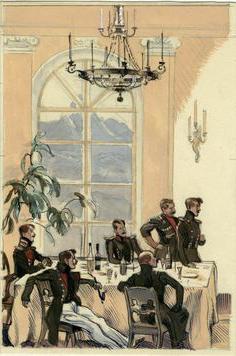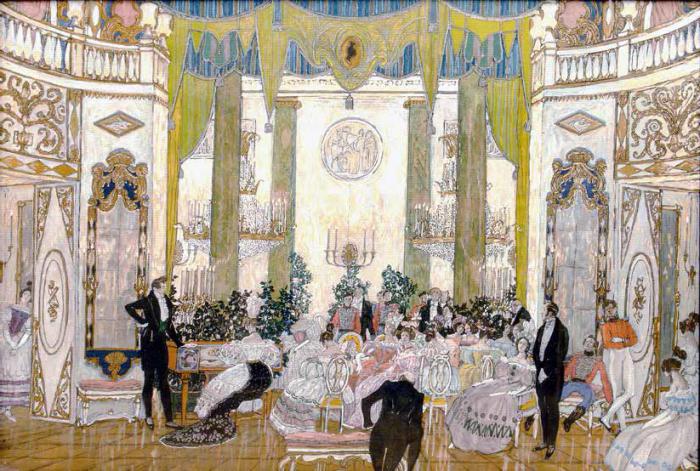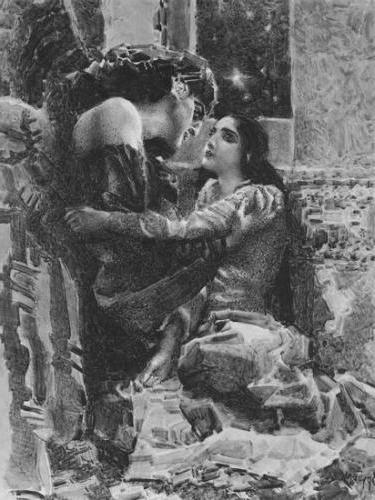Lermontov’s works, written in the years he spent at the cunk school, are hardly familiar to a wide readership. It is customary not to discuss the details of his life and work of this period or even remember, so as not to foul the bright memory of the genius of Russian literature. And meanwhile, it was then that Lermontov’s famous junk poems were written! “Hospital”, “Peterhof Holiday” and “Ulansha” cannot be called high-style examples even with a stretch, but you cannot remove them from the poet’s legacy - these cadet “pranks” affected his fate many years later.
Youth Throwing
Studying at St. Petersburg University, moving to Moscow University, then returning to St. Petersburg are rash acts of a carefree youth. Throwing between the educational institutions of the two capitals ended for Lermontov with the school of guards officers and cavalry junkers, where he was forced to enroll in 1832. A confluence of circumstances, the convictions of Petersburg relatives - and now M.U. Lermontov is at the cadet school. The romantic period of life is left behind.
The educational program for the junkers was quite rich, plus the soldier drill did not work in the best way for freedom-loving young men from wealthy families - and the young people spent all their free time studying in childish revelry and revelry. In our days, such pampering would be called stress relief, in those years the young psyche was spared less than ours, and junker life was called nothing more than debauchery.
Years of opportunity lost
The young man, who wrote his first brilliant poem - “Angel” at the age of 17, had to forget for a while about romantic images, to become like everyone else. Lermontov, despite the apparent weakness, was incredibly strong in his hands - he bent the metal ramrod, tying it in a knot, joking. This strength, the ability to easily compose satirical epigrams, and the artist’s talent helped Lermontov to be known among his bold junkers for his own. But at the same time, the brothers in the barracks did not need his romantic ravings - the comrades demanded a different poetry: vulgar, rude, not covered by shame. They needed cunk poems. Lermontov Encyclopedia replenished in those years with just such poetry. The mentioned “Ulansha”, “Peterhof Holiday”, “Hospital” are nothing more than a pornographic depiction of the real life of the junkers. Dear Lermontov, Pushkin also wrote frank intimate poems, but they were intimate, while Lermontov’s vulgar ones. For two years at school, the poet did not create anything outstanding - in his short life it was a mercilessly lost time.
Holy beyond ridicule
Despite the behavior of the junkers that was far from decent, some aspects of Lermontov’s biography suggest that the nobility of these young people was in the blood. The poet’s grandmother who loved her Michelle, E. A. Arsenyev, could not leave him alone. Having rented an apartment near the school, she settled a servant in it, whose duties it was to wake up her nervous and painful gentleman every morning a few minutes before school rise, so that the unbearable drum beat would not badly affect his psyche, and feed him with all kinds of dishes. The comrades who valued Lermontov’s shameless cunk poems knew about grandmother’s affection for the poet, but this tenderness was never the subject of their ridicule. Incredibly, the relationship between the grandson and grandmother was seen by young cunkers as almost a shrine. Contemporaries of the poet, all as one, note that they still allowed themselves to play a trick on Lermontov's parents , never on his grandmother.
Contradictions in the assessments of contemporaries
Immigrants from the cadet school, who, by and large, went down in history due to the fact that they studied with Lermontov, subsequently give radically different assessments of the poet’s relationship with classmates, differently characterize him as a person. And this is also a trace of what Lermontov wrote in those years. He frankly laughed at everyone, the names of some are forever associated with his poems and poems of the junker years. Among them is Tizengauzen, who is dedicated to the address of a famous poem, Shakhovsky, Polivanov, Prince Baryatinsky ... A whole poem is dedicated to the latter! How could he forgive Lermontov's “Hospital”, in which the hereditary prince in the cunk school was recognized by the following lines: “And our prince scrambled up with wine vapor climbed upstairs; pressed the latch - comes in with fervor, hands on his ... holding on. " Further narration of the prince's adventures is even less pleasant. According to the story, Baryatinsky, dreaming of an intimate meeting with a young maid, in the dark confused her with an old lady and attacked her with all the passion of his youthful impatience. Hardly such a glory, which was provided to the prince by Junker's poems by Lermontov, could give rise in his soul to tender memories of joint study.
Fatal acquaintance at the cunk school
Somewhere in the beginning of 1834 (Lermontov’s classmates claim that it was winter), the school decided to publish the handwritten journal “School Dawn”. He went out on Wednesdays. All week, everyone could write what they wanted and put their manuscripts in the designated drawer of one of the tables in the dormitory. On Wednesday evening, these manuscripts were stitched together and immediately read aloud. The most popular author of School Dawn was, of course, Lermontov. Mikhail Yuryevich’s cunk poems could not be published in these magazines, but from the pages of the school weekly they were well known to all cadets who studied with Lermontov. Another regular contributor to the magazine was none other than Nikolai Martynov — the damned killer of the great poet.
In his “Confession”, which Martynov wrote after a fatal shot, he tries to explain why then in Pyatigorsk he challenged Lermontov to a duel, why he did not miss. Resentments made by him from the cadet school, and left their mark here - Martynov could not forget the old ridicule of himself from the poet.
Junker Uncensored Being

Perhaps Martynov had reason to be offended by Lermontov, but those who were mentioned in the poet’s works had much more reasons. Their surnames are given above, but some facts from the everyday life of the junkers, transmitted in the poem Ode to the Need, speak of even more unsightly behavior of immigrants from noble families. If in a short work “To Tiesengauzen” Lermontov writes harmlessly: “Don’t drive so languidly around, round ... don’t twist, voluptuousness and vice willfully not joke ...”, then in “Ode to Nuzhny” the poet openly notifies readers of homosexual inclinations widespread among young men . What Junker poems by Lermontov or poems of those years do without another portion of defamatory revelations? Unless his "Junker Prayers" - it was they who were included in a thin collection of Lermontov’s works officially recognized by writers in those two years (from 1832 to 1834) that the poet spent at school. His frivolous poems were never published for obvious reasons.
Glory glory strife

If personal resentment ripened and grew in the hearts of some classmates, then frank stories in the light of those whose names were not reflected in the poet's works, played for him as a whole bad fame and generated prejudice in the hearts of completely strangers to the poet. The noble fathers of the families watched vigilantly so that at the balls and social receptions neither the vicious poet nor their daughters would come close - the fame of the author of vulgar poems that spilled out of the school limits to the author of the “Hero of Our Time” pretty much. But even the appearance on the pages of the capital’s magazines of Pechorin did not immediately erase the negative impression in the minds of the Russians that Lermontov’s cunk poems sowed in them. The poem Death of a Poet, written on Pushkin’s death, somewhat changed the general impression, but the final turn to the true recognition of Mikhail Yuryevich’s work was completed only after the release of The Hero of Our Time. Many years passed, many events took place before the light “forgot” Lermontov’s boyish stupidity.
Not only about everyday life

Lermontologists say that the wonderful poem “Haji Abrek”, as well as one of the editions of “Demon” were written just during the years of study at the cadet school. The comrades of the poet said that quite often after the end of the day, Lermontov went to distant classes and wrote there for a long time in complete silence and loneliness. It seems that two different Lermontov stayed at school: in the afternoon it was an ordinary cadet, not much different from other same bully and skeptics (hence his frivolous poems), and at night he turned into himself - subtle, vulnerable, full of romanticism and heart feelings. It is believed that Izmail Bay, which had begun in Moscow, was completed just during the years of study at the cadet school. Then the work began on the novel "Vadim", which was never completed. It is gratifying that Lunkontov’s cunk poems and poems faded after years against the backdrop of works dedicated to his beloved Caucasus, distant wanderings and wandering, other topics worthy of respect.
Revenge carried through the years
The school lasted only two years, but until the poet's death those frank poetic works followed on his heels. As already noted, the cunk poems of Lermontov reflected the shameful life of very real people. And two of those who studied with the poet at school played fateful roles in his life. These are Martynov (no special explanations are needed here) and Baryatinsky (his hatred of Lermontov only grew over the years). The beloved poet contributed to this.
Lermontov often visited Pyatigorsk, where his grandmother brought him as a child. What was it like to Baryatinsky, who, a few years after leaving school, became a field marshal, governor of the Caucasus and close associates of the emperor himself, to understand that his subordinates were whispering about his obscene behavior, forever spelled out in the notorious "Hospital"? And here also Lermontov looms before his eyes from time to time. Of course, Baryatinsky, by the power of his power, as much as he could, harmed the poet's career progress. These were the fatal consequences of cunk pranks.
All the best in the last three years
The construction of Lermontov's early poems, written in the early years of conscious creativity, is distinguished by both style and size. They strike with an almost complete lack of form and an abundance of bombastic epithets. From time to time, in some poems, glimpses of future genius can be seen, but literary scholars believe that all the best that Lermontov created was written by him from 1838 to 1841 - the last in his life. The “Angel” created in 1831 and the “Death of the Poet” created in 1831 are somewhat apart.
In the last three years, “Mtsyri” appeared, the last (eighth) edition of “Demon”, “Hero of our time”. Lermontov’s talent developed rapidly. How much would he write in the future, if not for the shot of a comrade in a cunk school?